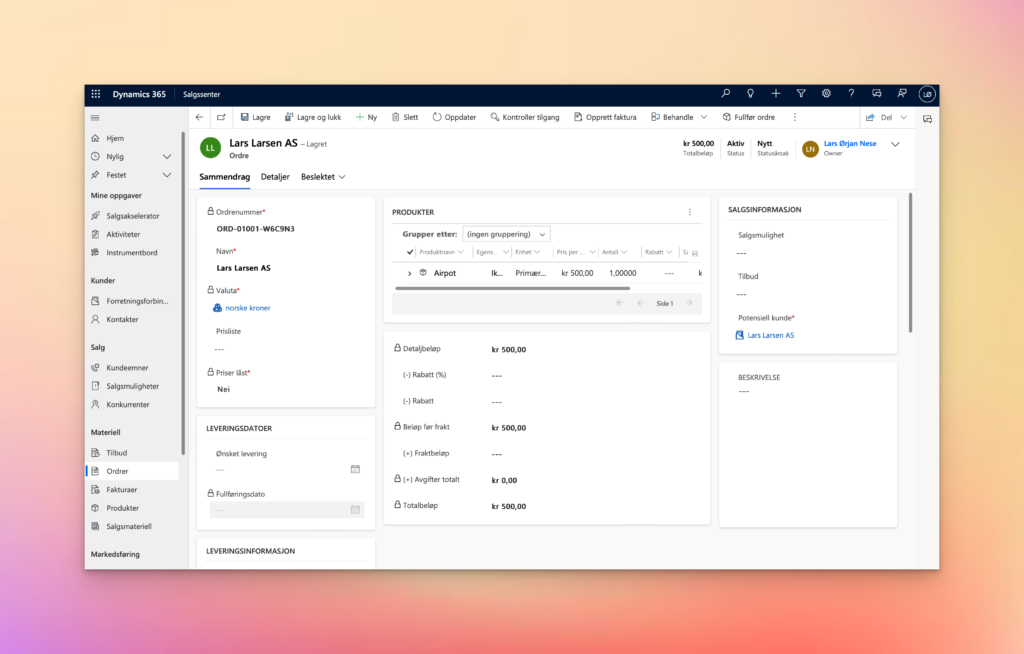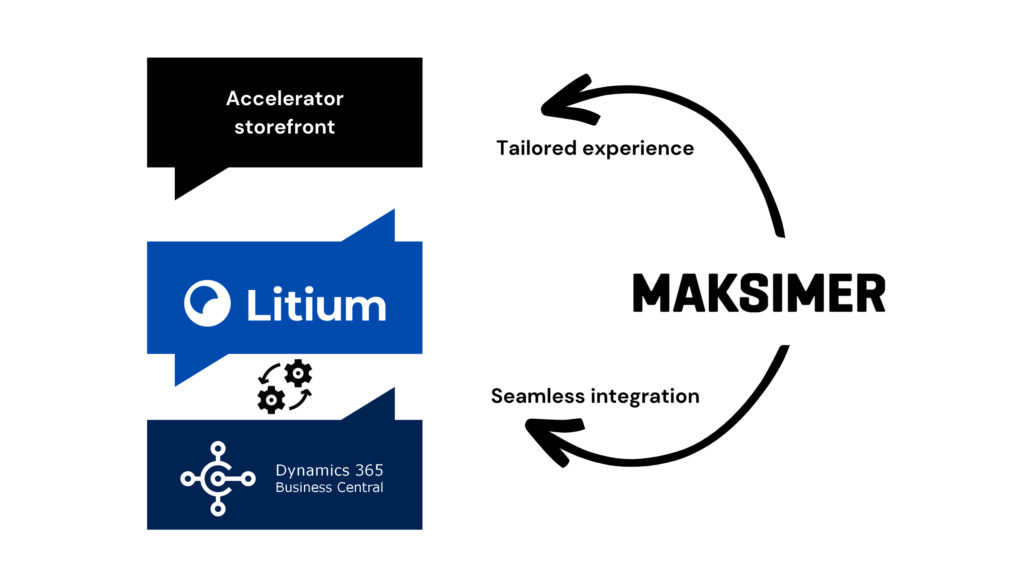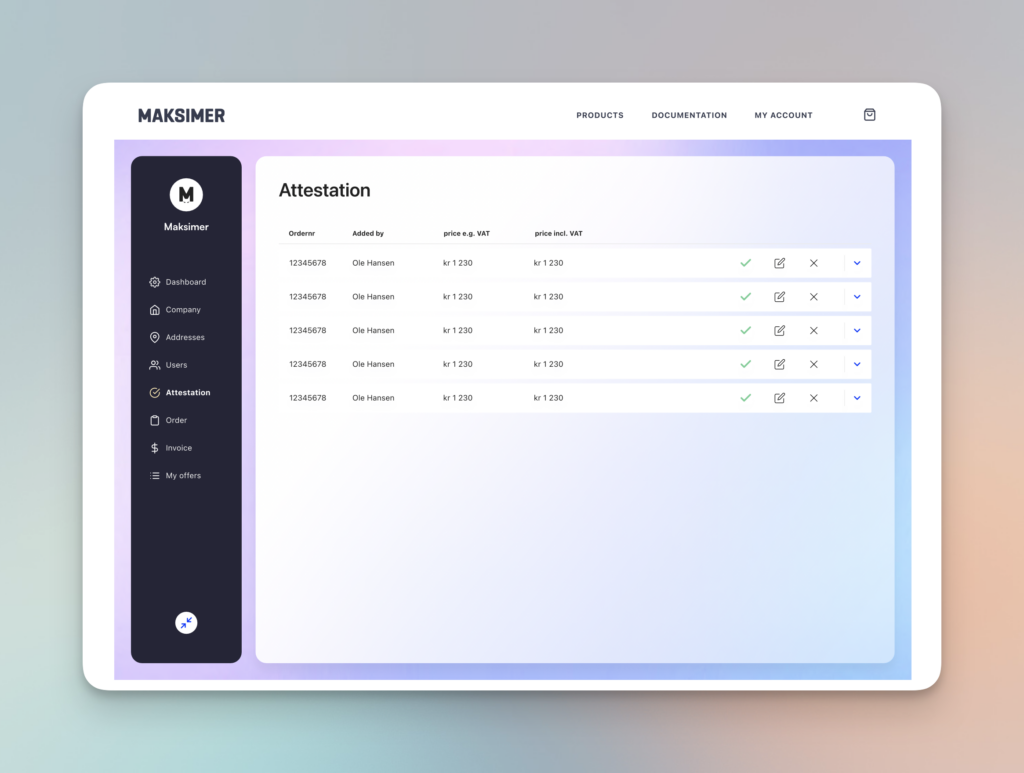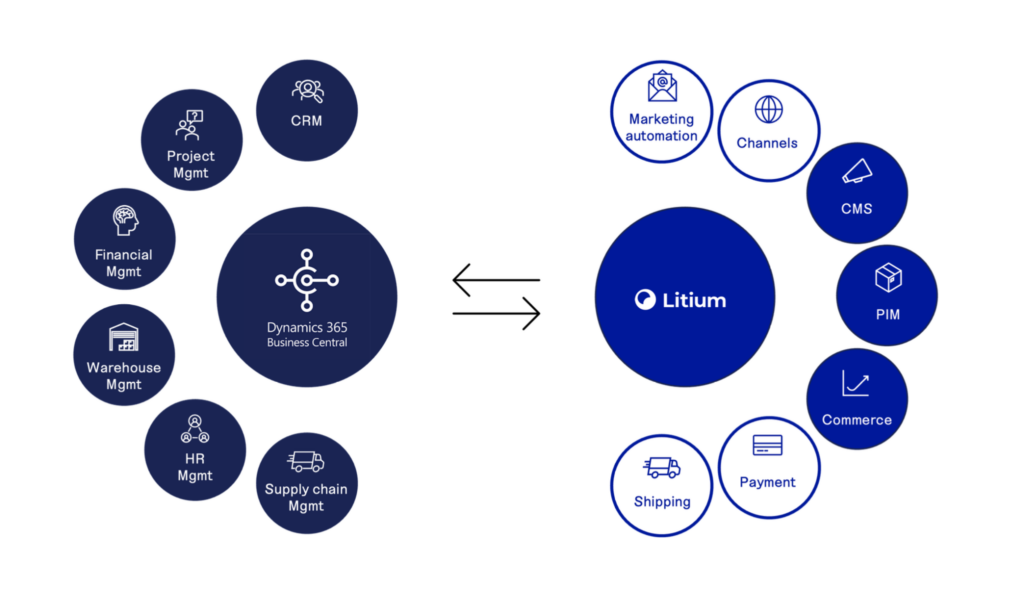Maksimer delivers e-commerce solutions on both WooCommerce and Litium platforms. Additionally, Maksimer provides ready-made and standardized integration solutions that facilitate seamless data exchange between the most popular business systems and e-commerce platforms.
The latest addition from the integration team is an integration between Microsoft Dynamics 365 Business Central and Litium.
Microsoft Dynamics 365 Business Central is a cloud-based business system suitable for small and medium-sized enterprises. The system is flexible, scalable, and highly adaptable. If you are accustomed to working in Word, Excel, and Outlook, you will quickly recognize the familiar Microsoft environment.

Litium Commerce Cloud, on the other hand, is a cloud-based e-commerce platform designed for medium and large enterprises with a need for flexibility and scalability.
What advantages does this integration offer?
- Time to market: Shorter time from when a product is created in Business Central to when it is available for purchase online.
- Speed and performance: Enhances the flow between Litium and Business Central.
- Reduce risk: Provides a more secure budget and timeline for the delivery.
- Lower total cost: Entry costs and maintenance fees are reduced with standard solutions.
How the integration solution works:
Since both Dynamics Business Central and Litium have modern APIs, Maksimer has all the prerequisites to build a solution that can fetch and push data to the right places.
Øyvind Flatekval, who leads the integration team at Maksimer, emphasizes the importance of their solution for the B2B market, providing options for approval, attestation, and control of e-commerce.

With a seamless integration of these features, Maksimers platform offers a comprehensive solution to manage the needs of corporate customers in securing order processes and payments.
– Our solution ensures that data exchange between Microsoft Business Central and Litium is completely seamless,” says Flatekval, pointing to the transferred data. “Products, inventory, special prices, order history, and the order journey are updated in both places. If you create a product in Business Central, it is also available on the website, he adds.

The term “order journey” is used by Maksimer to describe the entire process of an order, both ways. – When an order is created and paid for on the website, it becomes immediately available for packing and invoicing in Microsoft Business Central, explains Flatekval.
Once the items are ready for shipment, the funds are withdrawn from the buyer’s account, and the customer receives a notification that the order is on its way. The order history is updated on the customer’s account on the website directly from Dynamics Business Central.
– What’s particularly nice is that orders created in Business Central also become available online. So, orders made in a physical store are also visible in the customer’s online account, says Flatekval.

Companies can define access levels and roles for different users, ensuring that only authorized individuals can place orders and approvals. This provides a high level of security and control while simplifying the administration of their e-commerce processes.
Adaptation based on specific needs
Acknowledging that a standard solution may not fit all scenarios, Maksimer understands that different needs exist. When dealing with two systems like Business Central and Litium, each with strengths in flexibility and customization, there may be instances where additional customization in the integration is required.
– Of course. We sit down with the customer and go through all the requirements beforehand and during the process. If specific requests arise, we handle them accordingly, says Øyvind Flatekval, Integration Manager at Maksimer.
E-commerce is about the digital presence with your customers
Litium, headquartered in Sweden, is making significant strides in the Swedish and Norwegian e-commerce markets. They target customers who demand additional flexibility and functionality in their e-commerce journey.
Litium offers several solutions to this market, including Litium eCommerce, Litium PIM, and Litium CMS.
– In the system landscape, the ERP system is the most central in the system chain. E-commerce is about the digital presentation to the customer. The purpose of integrations is to have a natural data flow between systems, avoiding data silos, manual work, and inconsistency. Hence, integrations are done, says Seyamak Arkannia, a business developer at Litium.
He adds that these two worlds are often integrated, but it was previously done with customizations.


– But from a customer’s perspective, it should be a seamless whole. Maksimer has managed to address that, notes Seyamak Arkannia.
Organic expansion after collaboration:
As a Litium partner, Maksimer delivers and sets up this integration solution for end customers. The collaboration between Maksimer and Litium has happened organically, says Seyamak Arkannia.
– The partnership was put together when Maksimer started Swedish operations with a focus on Litium. It became an organic expansion. It was natural to look at the future together and build on the Swedish and Norwegian markets, explains Arkannia.
The goal is to make it fast and easy for the customer
– The goal of this package is to bring down barriers to getting started quickly. That’s why we developed a solution that makes it both cost-effective and rapid, says Arkannia.
Litium and Maksimer aim to create a comprehensive offering with these integrations.
– We want to make the decision to go all the way with Business Central and Litium as simple as possible,” concludes Arkannia.
